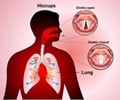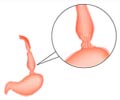Esophagus cancer associated with gastroesophageal reflux disease (GERD) is increasing at a rapid rate, says a review article published in the November/December issue of CA: A Cancer Journal for Clinicians, published by the American Cancer Society.
The article says that esophagus cancer is increasing at a faster rate than melanoma and prostate cancer. The rapid progress of the condition can be gauged from the fact that the incidence of esophageal adenocarcinomas has jumped by a massive 600 percent as compared to the 1970s. In comparison, the incidence of gastric cancers in decreasing, the article says. However, despite the alarming increase, the actual cases of the cancer of esophagus is only 7,000 to 8,000 new cases per year in the United States. In contrast, the American Cancer Society says that 145,000 people are likely to develop colon cancer by the end of 2005. The problem here is that there are no screening techniques that can rapidly diagnose esophageal cancer. The main conditions responsible for the development of the cancer are GERD and Barrett's esophagus. The latter is a condition where the lining of the esophagus changes to that of the intestine. This is a recognized a pre-cancerous condition. It is also theorized that obesity may play a role in the development of the cancer."People who get this cancer are those who have GERD and, in the U.S., probably 60 million people have reflux and about 20 percent of those have reflux on a weekly basis, and those are the ones who'd be most at risk to get this cancer," said Dr. Rhonda F.
Souza, co-author of the report and associate professor of medicine at the Dallas VA Medical Center and University of Texas Southwestern Medical School. "If you have chronic reflux, you need to pay attention, and if you have reflux and you have trouble swallowing, weight loss or bleeding, you should see a doctor. Those are alarm or early-warning signs." There have been studies, which say that aspirin and other nonsteroidal anti-inflammatory drugs (NSAIDs) could prevent the progression of Bartlett’s into esophagus cancer, but they have not been convincing enough. It is recommended that men in the age group of 65-74 get regular endoscopies so that any tumor can be detected early and treated aggressively.











